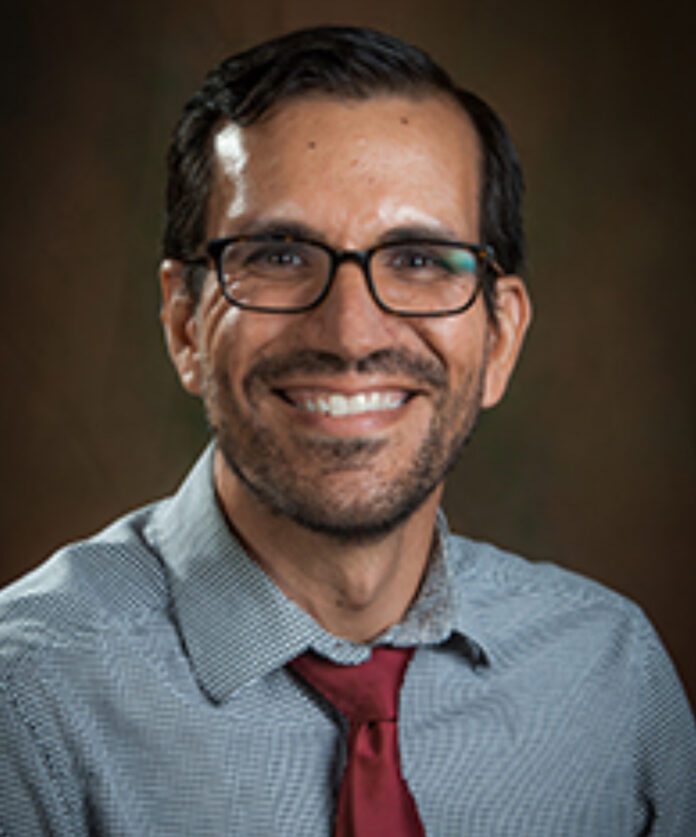If you have been around campus for a while, and especially if you have started on those language core requirements, chances are that you have met the wonderful Dr. Jose Espericueta, Chair of the Modern Languages Department at the University of Dallas. Renowned for his enthusiasm, friendliness and depth of teaching ability, Espericueta easily engages students in his classes and garners many fresh Spanish concentrators regardless of their majors. Whether it is conjugating irregular verbs or the past perfect tense, he creates an environment and energy that is simply infectious and makes the subject utterly fascinating.
Originally drawn to languages through the medium of stories, Espericueta was raised in a bilingual household and viewed firsthand the beauty of connecting with extended family through a shared language. Visits to his father’s hometown in Mexico also inspired his interest in other cultures and viewpoints. He found that oftentimes, the connection formed through speaking another person’s first language was unique, and he wanted to pursue that spark in his future endeavors.
“I am passionate about foreign languages,” Espericueta noted, “because I’ve experienced cases where you’re talking to someone and sharing something that you wouldn’t have been able to, had you not spoken a little bit of that person’s language.”
His interests in education came about during his undergraduate years, where he met many professors who inspired him to pursue his interests in the academic field. Then, when researching positions online, he came across UD and was pleasantly surprised to find many of its attributes fit his values. While its aesthetic sensibilities were certainly lacking at the time, the emphasis on education both generally and among the student body was exciting. During his initial visits, Espericueta ended up enjoying his teaching demonstrations at the university.
“The students were interactive, and they even laughed at my jokes. Then I gave a talk about my research and I got not just polite questions, but thoughtful questions. And I remember, too, it was in Braniff, hearing some students debate a topic discussed in [a philosophy] class, and that’s not common everywhere,” Espericueta said. “I like the nerdy, intellectual environment. That’s the way it should be.”
During his twelve years as an associate professor, Espericueta has had many memorable moments both inside and outside the classroom. However, one aspect of his work he has especially enjoyed is watching new language learners go through their first few years of study. The progress and growing proficiency is a great thing, and he also enjoys many thoughtful conversations and student projects, some of which are especially outstanding, and show their progression from beginner to a truly avid learner. The more general student culture was also something he appreciated.
“[I enjoy] being with students through the first two years of their language and then from the beginning media to the end when we’re reading primary texts,” he said. “But I think in the end, it’s not like one particular moment. Students make you feel a certain way. And it’s not just like when they give you feedback. I think we may have the record for students who write thank you letters to their professors at the end of the semester.”
Espericueta was also grateful for the ways he has grown within UD, learning to value the service aspect of his work, and growing friendships with his talented colleagues.
“I think we have an incredible community of professors here,” he said. “I think one of the great strengths of UD is the faculty and their expertise and their devotion to the university. It’s incredible.”
Espericueta also gave advice to the student body in line with his philosophy in class. He hoped that people continue to grow more open and interested in learning from other languages, and the cultures attached to them.
“Rejoice in finding differences in other cultures. It’s already a fact that we share humanity, and we share much more,” Espericueta said. “John Paul II says that different cultures are basically different ways of looking at the same questions, such as the meaning of existence and God, and I really love that. I think there’s something universal; we all are inclined towards wanting to know the truth.”
Thank you, Dr. Espericueta, for being a great hallmark of the languages department, a great professor and a friendly face at the university. The campus community wishes you the best of luck in your upcoming endeavors, and hopes that the memories and well-wishes of everyone join you on your path into the future.
